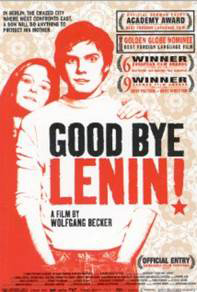
11/08/2013
German cinema, especially as it relates to the way in which Germans in the former communist East Germany looked upon the west, is the focus of a planned film series culminating in a lecture by Michael Richardson, a distinguished scholar and writer on German language, film and culture.
Presented by SUNY Cortland’s Project on Eastern and Central Europe (PECE), events in “Imagining the West from East Germany, i.e., the Deutsche Demokratische Republik (DDR)” are free and open to the public.
 |
| Konrad Wolf's 1964 film |
The films all will be shown on Tuesdays in late October and early November beginning at 7 p.m. in Sperry Center, Room 305.
Richardson, the associate dean for faculty and special initiatives in Ithaca College’s School of Humanities and Sciences, will lecture on “Imagining the West from the East: A Cinematic View” at 7 p.m. on Thursday, Nov. 14, in Brockway Hall Jacobus Lounge.
Richardson is an associate professor of modern languages and literatures at Ithaca College and co-editor of A New History of German Cinema (2012). A former chair of Ithaca College’s Modern Languages Department who has served on the college’s Honors faculty and Jewish Studies faculty, he will address the issues raised by the discussions and films.
Between the screenings and leading up to Richardson’s lecture, the series also encompasses interactive discussions with faculty.
The films are as follows:
• Konrad Wolf’s 1964 film, “Divided Heaven (Der geteilte Himmel),” will be shown on Oct. 29. “Divided Heaven” deals with the choice by a young woman to not join her lover who has fled to the West to advance his career. Set in a modernist style of the 1960s, the film explores the difficult side of life in East Germany and the central character’s determination to assert her own autonomy and to remain in a regime controlled by the Party.
• Wolfgang Becker’s 2003 work, “Good-Bye, Lenin,” will be presented on Nov. 5. This broad and comic satire tells the story of what happens when an older woman — a supporter of the communist regime — falls into a coma when her son is arrested by the police. Shortly thereafter the Berlin Wall falls and the doctor warns the son that if the mother realizes that her beloved regime has collapsed she may suffer a fatal heart attack. The son sets out to create the illusion of the regime in the mother’s sick room. A humorous film in one sense but serious in another.
• Christian Petzold’s 2012 Oscar-nominated motion picture, “Barbara,” will be offered on Nov. 12. A doctor who is being punished by the regime for expressing the wish to leave East Germany, Barbara is assigned to a provincial hospital. Her lover in West Germany prepares an escape for her, but she is faced with some complex decisions. This stunning and moving film forces those in the West to think deeply about the lives and values of people who lived in what Americans used to call “communist East Germany.”
 |
| Christian Petzold's 2012 film |
The program is geared to those who are interested in history, political science, philosophy, literature, international studies, physical education and German language and culture.
The series strives for a more complex look at relations between the two countries over the years in which the films are set.
“As the central figure in all three films is a woman, they will appeal to those looking at feminist themes in the divided Germany during the Cold War era,” said SUNY Cortland Distinguished Service Professor Henry Steck, a PECE series organizer.
“Our program addresses the way in which East Germans — citizens of the Deutsche Demokratische Republik (DDR) — looked on the West and how they manifested a sense of themselves, their society and their futures during the Cold War era,” he said.
“Our focus is on the post-1961 period when the Berlin Wall became a physical dividing line that intensified the differences between East and West, heightened the sense of being trapped and raised the stakes for those working through their identities, their work and their relations to those around them and to the society in which they lived,” Steck said.
The talks will encompass the role of film in depicting so vividly the existential complexity of life in the DDR.
“The films challenge the easy western assumption that the DDR had no emotional, political or personal hold on the emotions, commitments and lives of its citizens and that those ‘trapped’ behind the wall would want to move West as quickly as possible and whenever possible despite the dangers that fleeing might entail,” Steck said. “What deeper vision led the individuals presented in the films we have selected to make the choice to stay behind?”
The series is co-sponsored by the James M. Clark Center for International Education, the Center for Gender and Intercultural Studies, the Political Science, History and Modern Language departments, the Auxiliary Services Corporation and the Campus Artist and Lecture Series.
For more information, contact Steck at [email protected] or 607-753-4807.